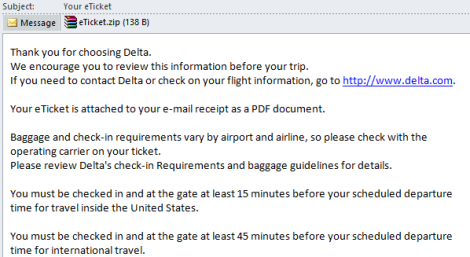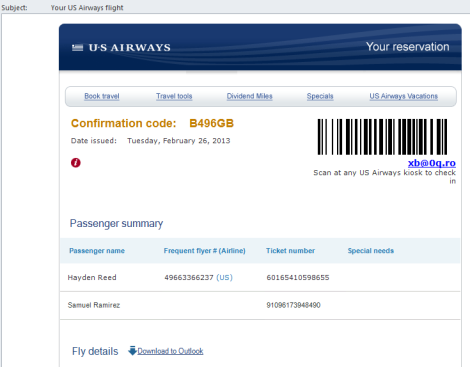The holiday season has given a chance for cyber-criminals to use the old technique of spamming the users with the fake vacation tickets. As per bit defender,more than 1.8 million spam messages are being sent daily out of which Airline confirmation and receipts makes nearly 60% of total spam.
Delta Air Lines, US Airways and the German Condor Flugdienst were the most targeted, being two of the biggest airline companies in the US and Europe serving each year millions of customers all across the globe. More customers mean better chances for such scams to pay off.
How does the scam works
An email is sent to the users which contains attached pdf which hides the trojan.Downloading the attachment makes your computer vulnerable for other malwares to target the system.Such emails are sent to Delta airline customers.


For US Airways,the email is sent to the users with a email confirmation about the booking.Clicking on
the link opens the weight lose plant ,other with exactly same name and appearance takes the user to exploit website.The website checks the browser for vulnerability and attacks with malware without user interaction.
Precaution to be taken:-
- Research the website you’re using before you book a flight or make a hotel reservation.
- Look what other people have to say about a certain ticketing / booking website. Read their comments and feedback on that site’s services.
- Try to get in contact with a representative of the company, who can provide you with as many details about the seat or the vacation venue as possible.
- Do not click links embedded in e-mails that pop up in your inbox if you haven’t specifically asked for travel offers or flight reservations. And never open files attached to these e-mails.
- When you leave for the vacation of your dreams, don’t announce it on social networks. An empty house can be extremely tempting for burglars. Securing your virtual world can help secure your physical one.
- Avoid shopping online or checking e-banking and credit accounts when using public WiFi hotspots such as those in airports, coffee shops or malls. Don’t do it via the hotspot in your hotel either.
The users may also receive the traveling discount emails with heavy discounts on exotic locations like India ,Peru with the attached pdf and will affect the computer in the same way as was explained above.
Source:- Bitdefender